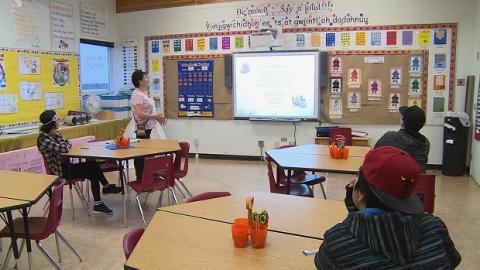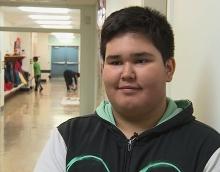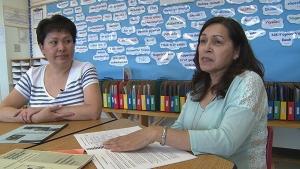 |
Canku Ota
|
 |
|
(Many Paths)
|
||
|
An Online Newsletter
Celebrating Native America
|
||
|
October 2015 - Volume
13 Number 10
|
||
|
|
||
|
Gwich'in Educators
In N.W.T., Bring Culture And History To High School Course
|
||
|
by David Thurton, CBC
News
|
||
|
credits: all photos by
CBC
|
|
Students learn
about respected elders, land claims, settlement patterns and family
structures
Gwich'in educators in the N.W.T., have developed a high school course for students that hopes to reclaim the aboriginal group's culture after the legacy of residential schools. "I think it's a reclamation of identity of who we are as a people and how we instill that in our youth," said Velma Illasiak, principal at Aklavik's Moose Kerr School. The course was developed by Gwich'in teachers, elders and cultural researchers after they met in 2014. It's taught in English and compliments Gwich'in language classes that students take throughout the Beaufort-Delta region. The course covers a range of topics about Gwich'in culture and history. Students learn about land claims, geographical settlement patterns, family structures and stories of respected elders.
"I always knew there was definitely more to learn about," said Grade 11 student Dwight Stefansson, who was one of the first students to take the course this year. Many aboriginal groups continue to struggle with the legacy of residential schools, where some students were sexually and physically abused and forbidden to speak their native languages. Some still blame the tainted history of the schools for low graduation rates among aboriginal students, which today hover around 50 per cent in the Northwest Territories. Teacher hopes course can make a difference "Some of us who have been in residential school for so long — education is so linked to residential schools we have to get over that," Gwich'in elder Ruth Stewart said when the curriculum was being developed.
That view has been passed down from generation to generation, and Gwich'in teacher AnnaLee McLeod hopes the new course can change that. She says some elements are getting students to sit up in their seats, especially when they learn about local elders. "Looking at them you see their eyes. A little twinkle here and there. And then they go, 'Who is this person?' And I go, 'You are related to that person,' and they go, 'What!'" said Mcleod from her classroom at Moose Kerr School. The elective course is being taught in the communities of Aklavik
and Fort McPherson and compliments a course developed for Inuvialuit
students. In addition to in-class study, the course also has an
on-the-land component.
Gwich'in Social and Cultural Institute launches maps of traditional place names
The
Gwich'in Place Names And Story Atlas
The Gwich'in |
||||||
|
|
|
|
||
|
|
||
| Canku Ota is a free Newsletter celebrating Native America, its traditions and accomplishments . We do not provide subscriber or visitor names to anyone. Some articles presented in Canku Ota may contain copyright material. We have received appropriate permissions for republishing any articles. Material appearing here is distributed without profit or monetary gain to those who have expressed an interest. This is in accordance with Title 17 U.S.C. Section 107. | ||
|
Canku Ota is a copyright ©
2000 - 2015 of Vicki Williams Barry and Paul Barry.
|
||
 |
 |
|
|
The "Canku
Ota - A Newsletter Celebrating Native America" web site and
its design is the
|
||
|
Copyright ©
1999 - 2015 of Paul C. Barry.
|
||
|
All Rights Reserved.
|
||


